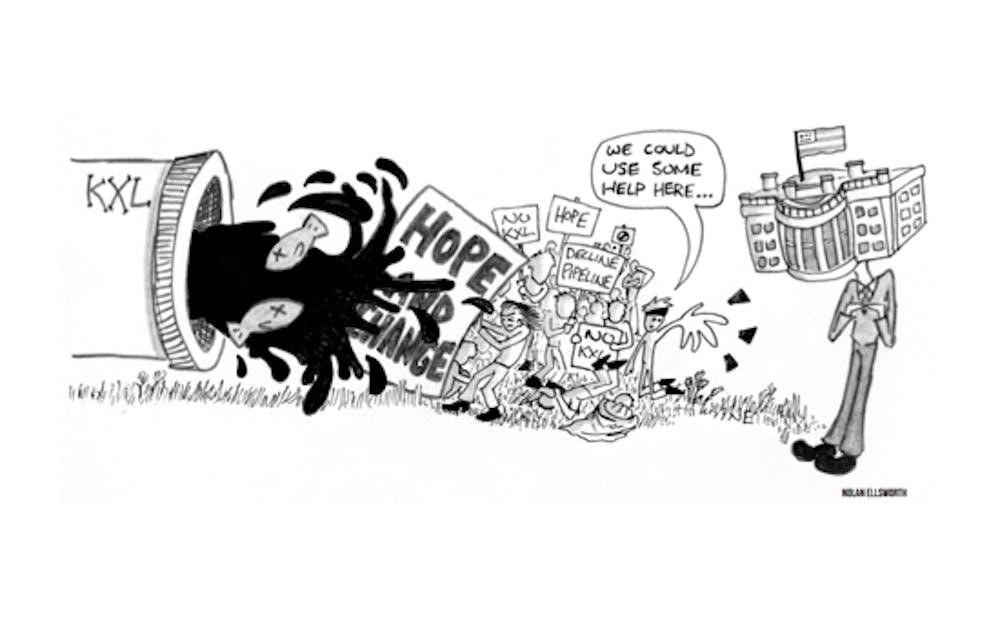What do you want to do when you graduate? Although I only have a year left, that question is quickly joining the list of things strangers ask you when you’ve just met them and they have nothing left to say. The answer is that I have no idea. When I think about how much I have changed every year since I arrived here, the prospect of thinking that far ahead seems laughable. No matter what I say to my parents’ friends or curious professors, even by tomorrow the answer will probably have changed.
But I’ve always believed that being passionate is half the battle. And I mean real passion, for I think we often confuse it with just anything you do. I mean the passion where you will go 110 percent even when you think you’ve reached your limit.
As most people who’ve met me quickly realized, I’m passionate about climate justice. So when the opportunity to travel to D.C. this weekend to protest the Keystone Pipeline arose, I and eleven other passionate students hopped on a bus and travelled ten hours to join 1200 other young people in front of the White House. Seven of us were arrested.
Now to many people I’ve talked to, this course of action seems silly. Why would you risk arrest? Aren’t you worried about finding a job? What would do your parents think? (For the record, my parents are the best and have been totally supportive, if a little taken aback.) Putting aside the fact that my arrest was the most privileged view of our criminal system one could get — it reminded me of the programs for parents to send their troubled kids to jail for a night to scare them straight — this was a risk worth taking, regardless of the career consequences or judgment of others. I want an employer who thinks it’s cool I was arrested for civil disobedience anyways, and the potential repercussions on my life are minute compared to the effects the construction of Keystone XL will have on frontline communities from Alberta to Houston and the climate impacts we will face for generations.
But too often, we get hung up on the conveyor belt consequences, the preconceived notion of what we are supposed to be doing as students at this college. How many times have you or your friends weighed a summer opportunity you are stoked about but is off the beaten path with a boring internship that may or may not lead to future employment but will at least be a resume booster? How many times have you not taken a class because you’re afraid it will be hard and god forbid you drop your GPA? How many times have you not joined a club because you were afraid it wouldn’t be seen as “cool”?
I too am guilty. The path we’ve been set on is narrow, and deviating is scary. But not doing what you love is even scarier. With a constant barrage of metrics, from grades to standardized tests, we’re constantly subject to the hierarchy of what society decides is valuable. Some of us succeed in this — our goals align with the goals set out for us — but for many, this push and pull gnaws away as you grapple with a future of financial insecurity or societal questioning.
But you never know what will happen when you take a risk and let your passion guide you. And if I were an employer, I would hire the passionate and enthusiastic kid with a few bumps on the road than the kid with the immaculate record (not limited to criminal records). Because the vulnerability of doing what you love teaches lessons that will last far longer than that Calc class you took. Because that kid knows what it means to fail and how to recover from it.
Maybe my arrest will haunt me later, but for now, I felt the strongest sense of community among strangers that I ever have and met incredible and inspiring young activists. I’m exhausted, my head is cloudy, I’m behind in everything, and I’ve never been more content. And I wouldn’t trade this feeling for the world.
Artwork by NOLAN ELLSWORTH


![Copy of Editorial [Susanna] (3) (1) (2) (1).JPG](https://snworksceo.imgix.net/mbc/11c1e285-1b2c-4ee9-9d20-4a2f24335290.sized-1000x1000.JPG?w=1500&ar=16%3A9&fit=crop&crop=faces&facepad=3&auto=format)

